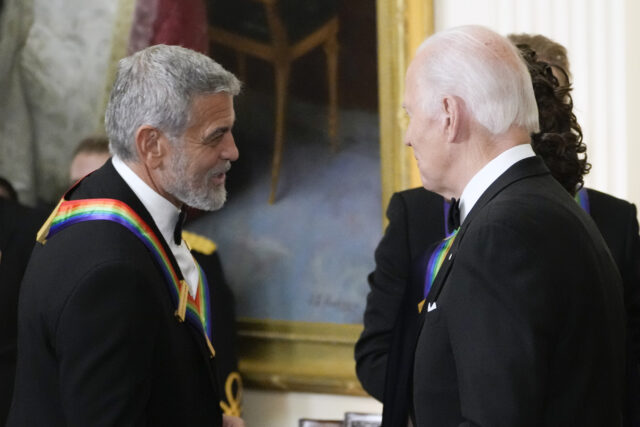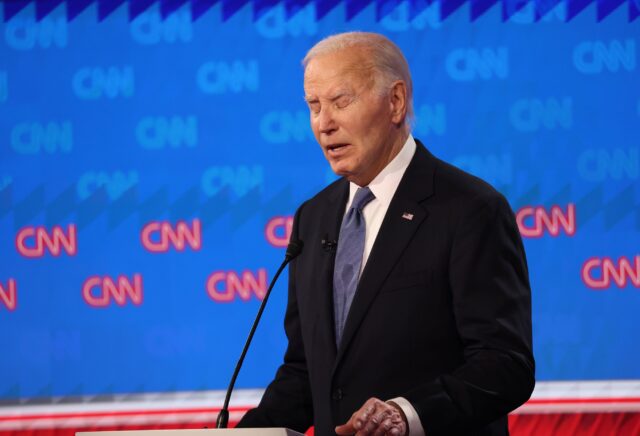Original Sin: President Biden’s decline, its cover-up, and his disastrous choice to run again
by Jake Tapper and Alex Thompson
2025
 The CNN anchor Jake Tapper and Axios senior correspondent Alex Thompson provide an inside account of how Joe Biden’s bid for a second term unravelled and the White House, the Democratic Party and large parts of the press helped paper over that decline until it was too late. Drawing on nearly 200 interviews, the authors weave a brisk and breathless narrative that straddles reportage and political autopsy. Original Sin is the first comprehensive account of how America’s oldest president tried—and failed—to defy both time and transparency.
The CNN anchor Jake Tapper and Axios senior correspondent Alex Thompson provide an inside account of how Joe Biden’s bid for a second term unravelled and the White House, the Democratic Party and large parts of the press helped paper over that decline until it was too late. Drawing on nearly 200 interviews, the authors weave a brisk and breathless narrative that straddles reportage and political autopsy. Original Sin is the first comprehensive account of how America’s oldest president tried—and failed—to defy both time and transparency.
The authors assert Biden’s tenure was significantly complicated by his declining health and cognitive abilities, and the systematic efforts by his inner circle to conceal these issues from the American public. The book’s central premise is the “original sin,” the decision to seek re-election despite visible deterioration—ultimately delivered the presidency back to Donald Trump.
The authors, drawing on approximately two hundred interviews, including lawmakers and White House and campaign insiders, paint a picture of a president whose capabilities were “…diminishing for years“. The authors found the first disturbing signs of Biden’s diminished capacities emerged as early as 2015, many around him chalked them up to the “Bidenness” of it all: “He was known on the Hill for being congenitally prone to long stories, gaffes, and inappropriate comments. Even in tightly choreographed Zoom calls with friendly audiences, Biden could step on a rake.”
By 2022, Biden began to regularly show signs of a stiffer gait, a softer voice, and an increasing number of moments where he seemed to freeze up, lose his train of thought, or forget names of top aides and long-time friends. The number of times Biden was recorded falling has become a genre of its own. Cabinet secretaries, even by 2024, reportedly felt he could not be relied upon for 2:00 a.m. emergencies. While initially many attributed his communication style to his “Bidenness”—a lifelong tendency for gaffes and rambling—the regularity and severity of his struggles intensified. Doctors observing from a distance speculated about a neurodegenerative or brain vascular disease.
Original Sin is the first comprehensive account of how America’s oldest president tried—and failed—to defy both time and transparency
Tapper and Thompson found Biden’s decision to run again—after privately suggesting in 2022 that one term might be enough—as the moment that set a cascade of denial in motion. They contend that by insisting on re‑election, Biden forced advisers, Cabinet members and campaign staff into ever‑larger acts of “gaslighting and denial.” This was fostered by a small, insulated group of loyalists, dubbed the “Politburo.” They reportedly shielded Biden from his own staff, filtered information, and made accommodations—such as using teleprompters extensively and limiting public appearances—to manage his diminishing capacity. This behaviour led many Democrats and journalists to feel they were being “gaslit” by the administration.
Tapper and Thompson accuse senior staff of lying not just to the public but to members of Congress and the Cabinet. From early 2023 onward, aides shielded Biden from unscripted settings, trimmed travel, edited video in slow motion to hide his shuffling gait, and even debated whether a wheelchair would be required in a second term.
The consequences for governing was Biden’s circle shrank, Cabinet secretaries reportedly went “months without seeing the president,” eroding normal policy deliberation and leaving de facto power with what the authors dub the “Politburo”—chief‑of‑staff Jeff Zients, adviser Anita Dunn and first lady Jill Biden.
The catastrophic June 2024 presidential debate is described as the “…undeniable turning point.” President Biden’s performance in the debate against Donald Trump proved to be a disaster for his campaign
Biden’s inner circle shielding the president from all criticism is highlighted in one of the most pivotal “events” that saw the release of Special Counsel Robert Hur’s report in February 2024. The Damning Robert Hur Report, ultimately concluded that no criminal charges were warranted regarding President Biden’s handling of classified documents, but it delivered a devastating blow by describing him as a “…sympathetic, well-meaning, elderly man with a poor memory“. The report highlighted that Biden’s memory in 2017 interviews showed “…significant limitations,” being “…often painfully slow…” and struggling to remember events or read his own notes. Crucially, Hur noted Biden’s inability to remember, “…even within several years, when his son Beau died“. The White House’s immediate reaction was one of fury and denial, with Biden’s lawyers demanding edits to remove these “…denigrating statements about President Biden’s memory“. The episode powerfully exposed to the public the very concerns about his cognitive fitness that his inner circle had been trying to conceal, and laid bare the administration’s “…complete denial that the issue even existed“.
 The authors highlight George Clooney’s alarming encounter at the Los Angeles Fundraiser in June 2024 that offered the first, public account that illustrated Biden’s deterioration through the eyes of a loyal and sympathetic supporter. Despite having known Biden for nearly two decades, Clooney was “stunned” by his appearance upon his arrival at the event, noting he looked “…severely diminished, as if he’d aged a decade“. Biden was taking tiny steps and had an aide guiding him by his arm. The most striking moment occurred when Biden approached Clooney, the host of the record-breaking fundraiser, and repeatedly said, “Thank you for being here,” without appearing to recognize him. An assisting aide had to gently remind the president, “You know George,” and then explicitly clarify, “George Clooney,” before Biden responded, “Oh, yeah! Hi, George!“. This interaction left Clooney “…shaken to his core…” and served as a powerful personal confirmation of the concerns that would soon erupt publicly. Even those deeply invested in Biden’s success could no longer ignore the reality of his decline.
The authors highlight George Clooney’s alarming encounter at the Los Angeles Fundraiser in June 2024 that offered the first, public account that illustrated Biden’s deterioration through the eyes of a loyal and sympathetic supporter. Despite having known Biden for nearly two decades, Clooney was “stunned” by his appearance upon his arrival at the event, noting he looked “…severely diminished, as if he’d aged a decade“. Biden was taking tiny steps and had an aide guiding him by his arm. The most striking moment occurred when Biden approached Clooney, the host of the record-breaking fundraiser, and repeatedly said, “Thank you for being here,” without appearing to recognize him. An assisting aide had to gently remind the president, “You know George,” and then explicitly clarify, “George Clooney,” before Biden responded, “Oh, yeah! Hi, George!“. This interaction left Clooney “…shaken to his core…” and served as a powerful personal confirmation of the concerns that would soon erupt publicly. Even those deeply invested in Biden’s success could no longer ignore the reality of his decline.
The authors chronicle Biden’s angry defiance in the House Democratic caucus zoom call. The virtual meeting with the House Democratic caucus in July 2024 provides a stark example of Biden’s anger and denial in the face of mounting concerns about his fitness. As House Democrats, candidly expressed their “…real concerns about whether you can win this race” and highlighted disastrous polling data, Biden grew “...defensive and angry“. He insisted he was “…the real progressive in the room…” and challenged dissenters directly. When Congressman Jason Crow stated that voters were “…losing confidence that you can do this in the second term,” Biden responded with irritation, urging them to “Talk about how I built NATO! Talk about how I enlarged NATO… Name me one. So I don’t want to hear that crap“. This outburst, observed by dismayed Democrats, demonstrated his short temper and his inability to absorb critical feedback, reinforcing the perception that he was “…rambling, long-winded, and at times incoherent“.
 The catastrophic June 2024 presidential debate is described as the “...undeniable turning point.” President Biden’s performance in the debate against Donald Trump proved to be a disaster for his campaign. From the outset, his voice was “…raspy and thin,” and his communication appeared “…reedier, weaker, softer, and less energetic” than in 2020. He visibly struggled to find words, closed his eyes “…to root around for what he was trying to say,” and made guttural sounds. His answers were often “…downright confusing…“, such as his bizarre and inaccurate claim that “…young women who are being raped by their… sisters“. The debate shocked viewers and immediately led to “…widespread panic…” among Democrats. Even those who had seen him like this privately were stunned by the public spectacle. This single event shattered the White House’s carefully constructed narrative of a fully capable president and propelled the party towards the urgent need for his withdrawal.
The catastrophic June 2024 presidential debate is described as the “...undeniable turning point.” President Biden’s performance in the debate against Donald Trump proved to be a disaster for his campaign. From the outset, his voice was “…raspy and thin,” and his communication appeared “…reedier, weaker, softer, and less energetic” than in 2020. He visibly struggled to find words, closed his eyes “…to root around for what he was trying to say,” and made guttural sounds. His answers were often “…downright confusing…“, such as his bizarre and inaccurate claim that “…young women who are being raped by their… sisters“. The debate shocked viewers and immediately led to “…widespread panic…” among Democrats. Even those who had seen him like this privately were stunned by the public spectacle. This single event shattered the White House’s carefully constructed narrative of a fully capable president and propelled the party towards the urgent need for his withdrawal.
The aftermath of the debate saw a rapid erosion of support. High-profile Democrats, including Senator Chuck Schumer and Representative Adam Smith, publicly and privately urged Biden to step aside, citing polling data that showed a rapid decline in his electability. Donors threatened to cut funding, and Democratic governors expressed grave concerns. Despite initial defiance and attempts by loyalists (including his wife, Jill Biden, and Hunter) to keep him in the race, coupled with a surge in energy from his base when he campaigned directly, Biden eventually suspended his campaign on July 21, 2024, citing the need for party unity.
Following his withdrawal, Kamala Harris became the presumptive nominee. The book notes that while Harris’s team had been discreetly preparing for this contingency, the rapid timeline and her past unwavering loyalty to Biden (even defending his performance after the Hur report) created challenges for her to effectively distance herself from the outgoing administration.
The book notes that while Harris’s team had been discreetly preparing for this contingency, the rapid timeline and her past unwavering loyalty to Biden (even defending his performance after the Hur report) created challenges for her to effectively distance herself from the outgoing administration
The authors do not blame the whole debacle on one man. The broader lessons from “Original Sin,” they believe, extend beyond one man or one party. The authors cite George Orwell on the human tendency to believe things we know to be untrue, highlighting themes of cognitive dissonance and groupthink. The book critiques the political system where power distributed by seniority and the deep investments of spouses, children, and staff in a politician’s career make it incredibly difficult for individuals to step down or for those around them to speak candidly about infirmities. It calls into question the lack of courage, cowardice, and patriotism in confronting such realities. The authors conclude by advocating for legal requirements to ensure greater transparency in presidential health, preventing future administrations from obscuring the truth as they argue Biden’s did.
Original Sin is a book for political junkies. It offers the first comprehensive account of how a clique tried to hide and get their man into the White House. Unfortunately, the book doesn’t provide an insight into who was signing the presidential decrees, or who was really approving laws. The book’s strongest passages illuminate the psychological toll of aging in the spotlight and the institutional temptations to conceal inconvenient truths.




